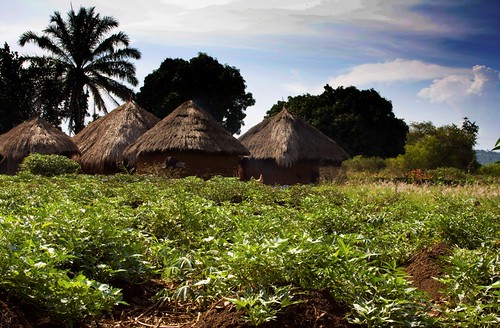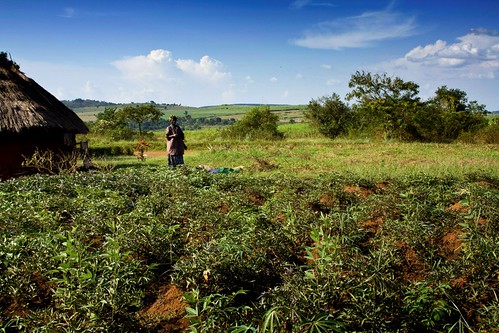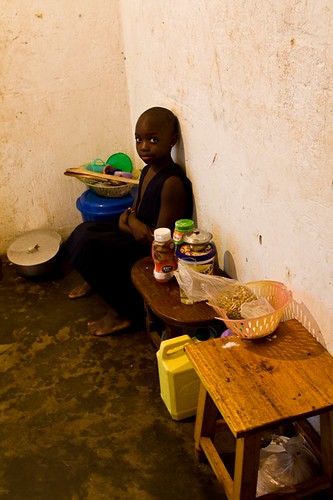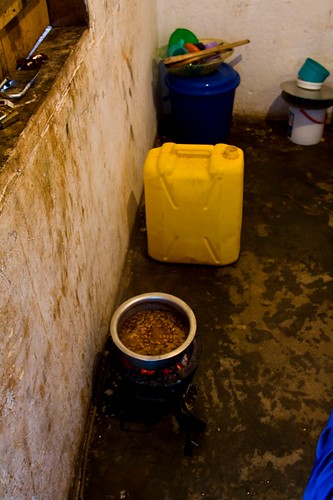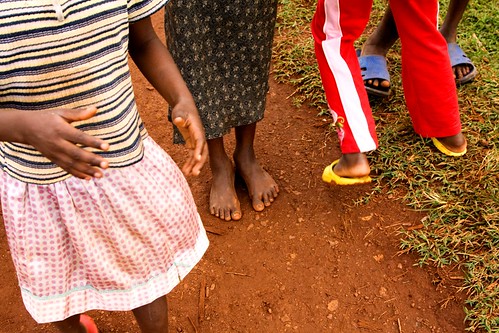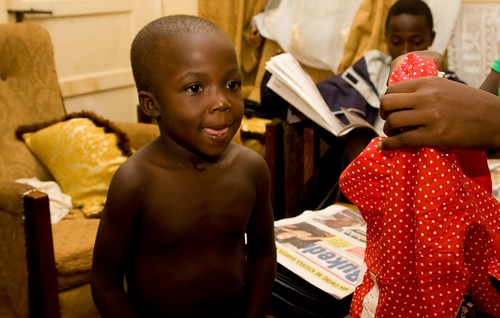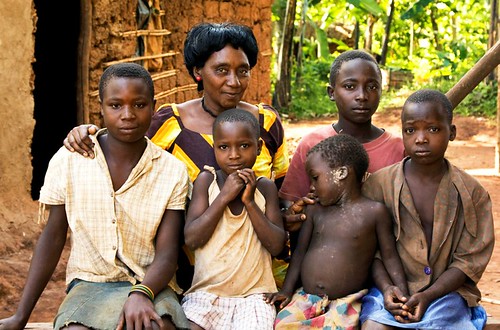A rattling door stirs me.
“I am off to work,” Margaret’s voice broke through the thick haze of my deep sleep.
“Okay,” I hear myself yelling back, pulling up my bed net and stumbling towards the door. I am sleepy slow; Mummy's already left. I lock the door to the house behind her. I look up at the clock; it is nine. Good. I am finally able to sleep in again. A Ugandan doctor who received his medical education in the U.S., and whose judgment and wisdom I therefore actually trusted, had suggested a new malaria prophylactic, which since I had started two weeks prior, had been disrupting my sleep, leaving me with just a few hours of fitful rest.
I reenter my bedroom, the bright morning outside waiting behind the floating orange curtains. The morning ritual: think: so much to be grateful for: my family, my Ugandan family, my friends, my house, food, my health, another beautiful day outside waiting to be experienced. I am vibrant and positive. I am ready for the day.
I let the light into my room and go for breakfast. On the table in the main room is a flask of African tea, a boiled egg and a piece of stale brown bread. This is more than most mornings. Sometimes there is just hot water in the flask, sometimes there is no bread and eggs are altogether a rarity.
I pull out my computer to do some work while I eat. I notice my fan isn’t on; no power again. I might get twenty minutes of work done on my laptop’s battery. I play around with a logo I am creating for the poultry business I am developing for my children, but it’s slow going working with an unfamiliar application.
Time to finish washing the clothes I had left to soak the previous night. I go into the shower room and pour out water in the basin and replace it with fresh water from the tap; at least the water is on. You learn here, yes, water is life.
I take a quick bath with cold water; no electricity means no working stove and no hot water. I throw my towel into the basin to wash – it’s been too many days since I can remember cleaning it. I pack up and head to town.
“Hi Mommy Ester,” I say to my Ugandan sister as she plaits a customer’s hair. Her shop is just behind our house on the outskirts of town.
“Hi,” she smiles back.
“How are you?”
“I am fine.”
“Good. The power is out again. I am going to town. I’ll be back around one. If there’s no power then, we’ll just buy the kids a plate.” The two youngest get out of school around midday. Usually lunch is taken at jah jah’s, but lack of electricity for the past few days has been complicating our usual eating patterns.
“Okay.”
“Also, can you hang up my towel later? It needs to soak a bit.”
“Okay.”
“Bye.”
I dodge bodas, taxis and lorries and cross the busy street towards the Youth Outreach Mission (YOM) office. YOM is a local group of young Ugandans dedicated to assisting their community, particularly vulnerable children. I met them through a group of Americans who were working with them this summer. In the previous weeks stress was building within me; how can I create an income generating project for my kids? Who would manage it when I leave? YOM is my answer.
“Good morning James. How are you?” I ask the young man sitting behind one of two small wooden desks in the relatively small, but bright room overlooking the busy street below, and the sugarcane on the far hills beyond.
“Fine.”
“How’s the business plan coming along?”
“It’s almost done.”
“Good.”
“I am almost done with the logo. I also need to go see the woman today and show them the earrings I got in Rwanda.”
I set up my laptop in their office and fiddle more with my logo; I am spending way too much energy on it; not a good allocation on my time, but I’ve become a little fixated on the task.
Just before midday I walk with other YOM members down the road to a small shack with a half a dozen women crowded inside talking lightly, moving their hands quickly around twine, beads, and paper; they are a part of a beading co-op established by the Americans and YOM. The co-op is comprised of widows and single women who have little or no other source of income and have children they are struggling to look after.
Usually I pop in to say hello and take some snaps, but today I am delivering some of the beautiful hand-made earrings I had purchased at the Women for Women International office in Kigali, which has a comparable co-op with a similar mission.
Ohhhhh. These ones are good.
The women are all impressed by the well-made woven jewelry, the bright colors and smart designs are eye-catching. I had bought several pieces in Kigali as gifts for friends in America. Sandra, one of the YOM members supervising the woman examines the earrings closely; all of the beaders watch admiringly.
“Can we have two?” Sandra asks me. I look at her quizzically. “I want to see how they are made, so I will need to take them a part.”
“Oh. Sure.” I am a little disappointed that two of my friends at home wouldn’t have the unique art dangling from their ears, but this group of woman new to jewelry-making could learn much from the high-quality product; it is an investment for the poor African woman, while a frivolity for my American girlfriends. I smile at the woman looking at me.
The woman continue to chat in Luganda, eyeing their work, that of their friends’, lounging in the shade of the thatch roof, beyond a brutally hot day begging for an explosion of rain.
There is sudden loudness outside; harsh tones, a flash of a stern expression and sinewy arms stretching out of a bright yellow tank top; the man I had seen abusing a couple of three year old girls a few days before is there. Our shack rests against the back of a concrete home and faces another residence, a small block of rooms, one of which I assume the bitter man rents for his family.
“Who is he?” I say aloud to the group as he struts through his yard glaring at me and I back at him, he looks forever on the verge of starting a fight.
“He lives there and owns that shop,” Sandra said pointing to a stand across the small dirt road.
“He is really nasty with those kids.”
“He is very rude,” Sandra confirms matter-of-factly, in typical, non-aggressive, almost polite Ugandan fashion. Ugandans don’t elaborate; nor do they call people names; nor do they curse. A Ugandan calling a person rude is like an American calling someone a fucking asshole. I agree with her.
“You tell me what a girl that small could do to make you beat her and yell at her like that?”
“Yes, we are trying to help those girls. That’s why they are always here. They really hate him too.” Now I recognize the children. I had seen them a couple of weeks before inside the concrete house the little beading shack rests against. The woman had been forced into the home to bead that day by a heavy downpour; the little girls ran in and out of the room giggling at me, shrieking at the pale face.
I look through the gaps in the shack at the two children playing with each other in their front yard and frown, thinking of them living in fear of the menacing presence that is their father. I turn my gaze back inside to the faces of the woman around me, many abandoned by their husbands, left to care for themselves and their children with little or no money, with few skills to earn a living. The muscular African man that I just witnessed tear through his front yard screaming at his children was not an aberration, it was an all too common display of African masculine arrogance and domination; and he is at least, unlike many, supporting his children. I shake my head; I didn’t envy African woman.
I wish the woman a good day and make my way back to Ester’s salon. My two little angels sit on the rickety wooden bench at the shop’s threshold; apparently the power isn’t back on at jah jah’s.
“Hello! How are you Sylvia? How are you Taka?”
“I’m fine,” my two youngest greet me giggling, playful; they are always delighted, almost speechless to see me.
“Okay. Let’s get you some lunch.” I walk past a few shops to the one with the lady who can really cook good Ugandan food.
“Give me two plates please.”
I make sure little hands are washed, remember with soap, washing with just amaazi is not good. The girls tilt the jerrycan filled with water and pour it over their hands into the dirt, push blue soap over their fingers and palms and rinse. The cook, Florence, brings us our food; the girls share a plate and I took one for myself. I pay the woman $1.50. Mama Ester only wants a soda. I give the shop keeper $0.35 for the bubbling purple drink in the sweating glass bottle.
A ragged little girl with a homely face and beat up cleats is loitering near my children, trying to talk to them and touch them awkwardly, and the girl keeps eyeing me, looking at me funny. She wears a royal blue uniform from the same nursery school as my children, but it appears to not have been cleaned recently; my children are shying away from her, they look uncomfortable and slightly annoyed.
“Do you know this one?” I ask them.
“No.”
I study the girl. I think of Deborah. I think of how Alice, Ester’s boss, doesn’t let unknown kids around her shop since they do funny things. I think about all the stories I hear of the town kids breaking into people’s homes, stealing scrap metal, lying, being mischievous. I can’t help every kid. I can’t take chances.
“Okay. Bye-bye.” I say to the girl waiving. She stares at me. “Bye-bye. Gen-da.” She doesn’t move.
“Gen-da!” Ester exclaims to her. The girl finally slowly moves away. We start to eat.
We are a few bite into our meal then Florence walks towards us excitedly, leading the homely girl by the arm. She speaks to Ester in wild Luganda. She flings the girl off. I think I know what happened, but I ask anyway.
“What happened?”
“The girl went to Florence and said that the muzungu told her to give her a plate.”
My assumption was right. The girl lied to get a meal.
Many of the kids around town see me with my kids and think they can get in on the fun; get the food my kids are eating, get the attention they are receiving, get the books they are reading. I can imagine what the town kids are thinking. They’ve probably never even seen a white person before and they see one with black kids and think, hmmm, why can’t that be me? Why can’t I hang with this muzungu and get good food and love and schooling? I can’t blame them since many go without these things.
Rachel pushes the last of her food into her mouth, most of her meal looking like it ended up on her dress.
“Okay. Let’s go see your uncles at the office!” I exclaim. Rachel and Sylvia grin. They love their uncles.
We walk back to the YOM office, a child holding each of my hands. Rachel sometimes singing Mommy! Mommy! and I look down and she does something to impress me; throw her leg high in the air, shuffle her feet, skip; sometimes she will say my name and I will look down and she’ll just smile at me.
“Ah! Rachel! You hold my hand. You hold my hand when we walk - especially when we are in the street. Look! See the big motor cars. They could come and hit you.”
Rachel blankly looks up. She doesn't care, all the girl thinks of is play.
I carry her up the steep, uneven concrete steps two flights walking behind a slow Sylvia to the YOM office; their office situated in one of only a few three story buildings in the flat town.
The girls joyfully greet their uncles: James, Godfrey, Robert and Paul. These YOM members are the ones we usually see in the office, although the organization has a few dozen members. I get out my laptop and continue developing the Mama Mzungu Poultry Farm logo while three of the young men sit behind their computer working on the business proposal and my girls play, half-heartedly listening to Robert as he tries to teach them some English. Bad American pop and R&B spills from the YOM computer. I ask them if I can put on my music when J-Lo drifts through the room. The skies open up and water pours from grey heavens. Rachel tells us she has to susu.
I walk her and Sylvia back down the steps through the dirt and uneven concrete courtyard behind the office building trying to dodge the huge drops of rain. I get the key to the latrine padlock from the abnormally short woman with glassy eyes that works in the lab below; I know her; she has done some malaria tests for me.
I unlock the latrine with Rachel dancing and giggling at my side; she is sometimes absurdly, inexplicably happy. She rushes through the wooden door that is falling off the hinges to the concrete pit and squats; no toilet paper. I go back to the woman at the lab.
“Do you have paper?” She looks around as if I've asked of her a huge inconvenience. “Never mind. I’ll go buy toilet paper.”
I walk through the courtyard to a shop and wait a few minutes for the woman to move a several feet and reach up for toilet paper, hand it to me and take my coins. I go back to the latrine. The girls are already gone.
Back in the office the two of them are dancing and leaning on their uncles.
“Rachel. You come here and Mommy will wipe you.” She runs to me, pulls down her red underwear and squats her butt towards me. The two youngest aren’t very good at cleaning themselves after they use the toilet. The day before Sandra returned from the latrine with Rachel and confirmed that the girl's bottom was dirty after I had warned her of the child's poor self-cleaning habits.
"I think she already used the toilet at school today," Sandra had said with a knowing look.
One day last week Mama Ester told me to ask Sylvia her new name.
Sylvia very seriously said, "Stinky." I laughed. Why?
“I came to the house and she made the whole place smell. So I said she was Stinky,” Mama Ester told me laughing.
"Stinky! Stinky!" I exclaimed to Sylvia. She was a little confused as to what the word meant, but relished in the attention, laughing with me.
“Here. You use some of the magic muzungu soap,” I say to the two little ones, pouring a few drops of antibacterial gel into their hands, a small bottle of which is always in my purse. The girls gleefully rub their hands together. This usually prompts Rachel to say ten minutes later, Mommy! Mommy! and rub her hands for more.
“No Rachel. You don’t need to wash your hands now, but I like your enthusiasm,” I say to her knowing it’s not cleanliness that interests her so much as mommy's special concoction.
We pass time in the office, talking, playing with the kids, working on our computers. It’s after five in the afternoon, time to get going. We walk past the small shops. Do the kids need more food? Do they have enough soap? What about sugar and salt? I had bought the children several food stuffs a couple of days before, they would be okay for at least a couple of more days. I hope Richard is taking his medicine and remembered to go the hospital today during their mid-morning porridge break. I'll have to remember to ask him and remind Ester.
I walk with the little ones to Mama Ester’s salon. She looks at me with a vague sense of excitement and concern. She tells me that Agnes and Richard did go to see their father yesterday in the village.
I am mad.
The afternoon before I had arrived in Namengo to see the four young children sitting on their stoop locked out of the house, they had been there since morning and had not taken anything to eat or drink all day. Agnes and Richard had disappeared early without telling anyone where they were going while Beatrice was out fetching water and Sylvia and Peanut were at Mass; they had left Rachel alone outside.
“And Richard. He and Beatrice were fighting today over the school sweaters and he threw his in the grass. A man saw it and came and told me, so I told Richard to go get his sweater from the field and he wouldn’t . He just stood there looking at me. The man went to go get the sweater for me,” Ester says.
“What? He threw his sweater in the grass and when you told him to get it he wouldn’t?” I ask in disbelief. Ester raises her eyebrows in confirmation.
Now I am really mad. The kids had been begging me for school sweaters. I had just purchased each of them one last week and now Richard was being stubborn and throwing his away and not minding his African mommy. Ugandan children are expected to listen and be disciplined, this type of behavior is absolutely unacceptable and not typical of my usually well-behaved Buganda children. This was bad.
"Okay. Let's go talk to them now," I say to Ester and motion for a boda. We make our way almost a mile down the road to the children's home.
"Jan gu!" I say sternly to the children as Ester and I walk past them on the dirt clearing outside their home. They follow us into their tiny front room. "Sit!" I direct them motioning to the ground. The four youngest sit on the concrete floor, Richard in a dilapidated folding chair to my side, Agnes leaning against the wall sucking on raw sugar cane.
"You two! You left for the village yesterday and didn't tell anyone,"I say shaking my finger at Richard and Agnes. "And you. Agnes. You did this before and we told you not to do it again, but youdid it anyway. You can go to the village, but you must tell us in advance. You can't just run off and not tell people where you are. And you left these ones outside without any food or water," I say pointing to the girls on the ground. "You must be more responsible!"
I look over at Agnes. I can never discern her reaction to reprimands; if she is really listening and trying to learn a lesson, or if she is being obstinate. She continues to look at the sugar cane, busily chewing on it.
“Agnes, you want to be a nurse, but nurses are responsible. A nurse wouldn’t do something like this. And Richard, you are thirteen. You are old enough to know better too.” I pause. “There are no school trips for one year for you two. Ester, you translate.” I look at Ester. She is sitting at the table sorting yellow beans.
“They know that one,” she says not looking up.
“And if you do this again, you can stay in the village,” I say emphatically.
“Oh. Oh. If you do this again…” Ester says shaking her head. The threat of them again living in the village is useful for Ester and I; a proven deterrent against bad behavior. The threat, of course never to be realized, is the only serious punishment option by default. There are no T.V., phones, movies, outings, etc. to take away. No way to ground them. Most Africans simply beat misbehaving children, but Ester and I abhor that cultural norm.
“And Richard,” I say turning to the boy at my left. “What is this about you throwing the sweater away and not minding your Mama Ester? I gave that sweater to you as a gift. How would you like it if you gave me a gift and I just threw it away?”
Peanut starts laughing below.
“Eh! Peanut this is not funny! This is serious! I don’t want any more of this funny business! All of you must behave better and mind your mommies! It is not easy for us to be taking care of you. Mama Ester is working hard to look after you here in Namengo and Mama Muzungu is not made of money. You need to show your gratitude by minding us and taking care of the things that we give you.”
I look around the room, all solemn faces except for Aggie’s; she is unreadable.
“We love you very much, but are disappointed in some of the things that you have been doing. We want more from you. Okay?” I start to make my way to the door. “I am going now. You think about what we’ve said and how you’ve been acting. Sula burungi.”
I walk out the door into the glowing evening light. I run back to sugar plantation considering the children's behavior and how best to guide it as my feet pound against the dirt and I wind my way through the lush plantation gardens.
I return to the Balaza's. Thankfully there is power. I heat water on the stove, pour it into the basin and bathe, sponging and throwing warm water on me. I emerge from my room clean and refreshed and Ester and Margaret are sitting in the main room watch a fuzzy TV. I ask Ester if the children said anything after I left.
"They said they were sorry and that they wouldn’t do it again." I am grateful for the response, but unsure of myself trying to encourage and discipline little ones that aren't really mine, who are a part of a culture with different expectations of children, and living in a land with foreign parenting tactics. I turn to Margaret sitting on the couch to my left.
“Mummy. Is there something else that Ester and I should do?”
She shakes her head. “No. The two older ones have been very disappointing, but we just keep coaching them and hope they mind.”
“That stupid father. I think this is mostly his fault. You know those kids were acting fine until he came to visit them two days ago. He probably told Aggie and Richard to come see him and to not tell us.”
“Yes. That man is very bad.”
“And he even lied to us too. I asked the father yesterday if he had been with the kids that afternoon and he said ‘No’. He lied to my face, and to Stephen’s and to Robert’s.”
The father had come to visit the kids on Saturday and then came the following afternoon to the Balaza’s to speak with us about the children's land. He had traveled to Lugazi with Agnes and Richard after they came to visit him earlier in the day, but the father denied seeing them.
I go back to my room, irritated and surprised by their behavior. I seek to raise respectful, honest, hard-working children.
I sigh. I know it would be okay though.
The kids are good. I can see it. And their teachers’ and neighbors say so. Agnes and Richard’s poor judgment and selfishness was out of character and seemed to be mostly instigated by their father’s recent interaction with them.
What can I learn from this? I consider it over and again, buzzing through my mind as I try and wind down to sleep. We will just have to more tightly control the father’s interaction with them. And the Balazas, Ester, the YOM team and I will have to be united front working together to ensure not only the children’s best interest, but to see their proper development; we will have to serve as good role models to counter the negative example set by their father; a man whose only good deed in life appears to have been bringing five wonderful children into the world.
I hit the light to my room and cast it in darkness. I climb back under my bed net very quickly, mosquitoes easily follow me under if I am not fast. I close my eyes and think of the kids, how happy they are, how happy they make me. I drift to sleep content, peaceful; resting to arise for another day of excitement, challenges, laughter and love.


